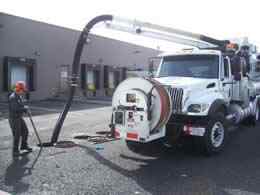
Hydro excavation is the science of digging with water. It is a non-destructive process that involves using pressurized water to excavate and evacuate the soil.
Industries That Benefit from Hydro Excavation
The process of digging and moving the soil is good for the plumbing industry because sewers and pipelines are underground. So digging in the soil will not damage them. It’s also a faster process than other methods.
In the construction industry, you can’t build anything without a secure, solid foundation. That means the ground must be excavated. The benefits of doing hydro excavation are that it’s less costly, faster and less intrusive than traditional methods.
For landscaping companies, hydro excavation is much more precise in helping to arrange plants and trees. It’s also more thorough, a process that is able to uncover anything buried up to 30 feet below the ground.
There are, in fact, many other businesses that would benefit from hydro excavation. You may want to build an addition to your existing company building. You may have old trees that need to be moved in order to begin the project. Most importantly, you’ll want to be sure you’re starting construction on a solid, clean foundation. At VacTone, we can help you do this.
Hidden Damage
Using other means of excavation can create a real mess. Underground there are pipelines, phone lines, fiber optic lines, utility cables and other elements that you wouldn’t want to damage. More industries choose hydro excavation to prevent unnecessary damage to existing systems. It’s a more clean and precise method.
The Process
Hydro excavation uses pressurized water to dig into the soil. At VacTone, we have self-contained trucks that do the digging safely and swiftly. Special rotating nozzles vacuum the soil sludge (slurry) through an eight-inch vacuum line into a debris tank that’s dumped at the end of the day. Our machines are able to go around pipelines, cables and other underground utilities. Then the sludge is collected in the tank on the truck. Once it’s full, the vacuum automatically shuts off. Usually, what is collected is only dirt and water, which goes to a dirt landfill for disposal.
Hazardous Materials
What if the sludge contains contaminated, toxic material? This may happen at oil, gas or chemical plants. In that case, there is a dump site within the facility that is specifically for the safe disposal of hazardous material. Our contractors would then ensure that the material is disposed of at the facility where the hazardous sludge was uncovered.
Working with VacTone
This kind of process requires professionals who are specially trained. VacTone operators are trained for safety, as well as in dealing with hazardous material.
VacTone Environmental Services, serving Massachusetts and southern New Hampshire.
